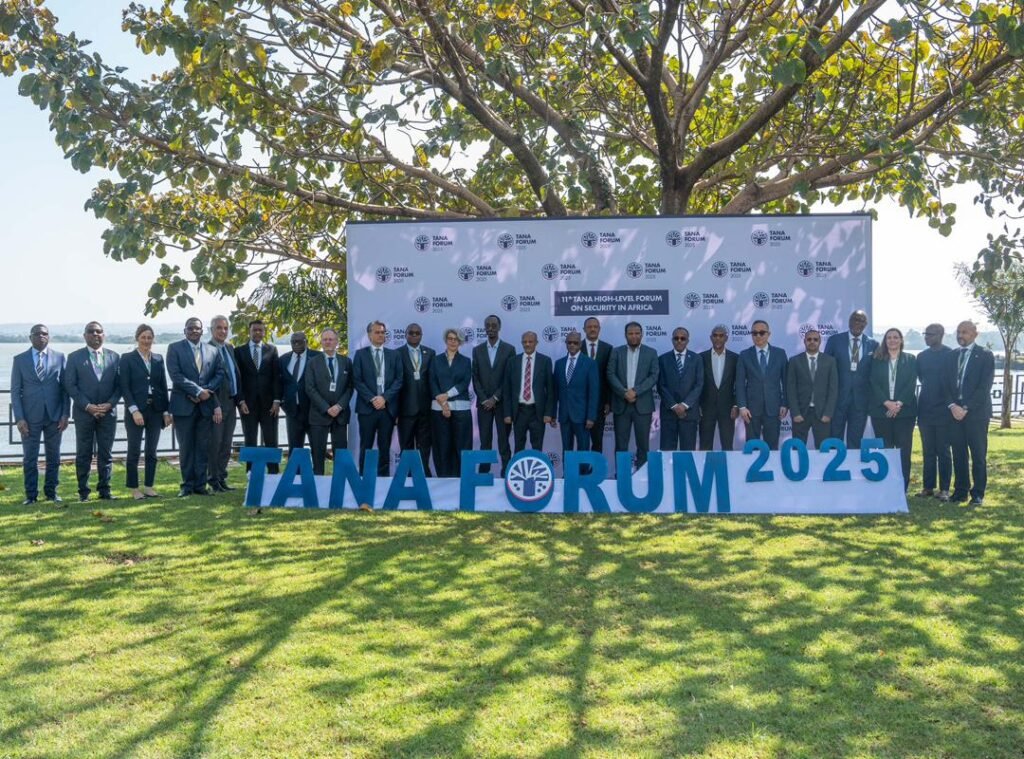The 11th Tana High-Level Forum on the Security of Africa was held in Bahir Dar and Addis Ababa from October 24–26 under the theme “Africa in an Evolving Global Order.” The forum brought together high-level participants, including ministers, former leaders, special envoys to the Horn of Africa, and civil society representatives.
The opening session held in Bahir Dar kicked off with welcoming remarks delivered by the President of the Amhara Regional State, Arega Kebede. Welcoming participants, President Arega expressed the regional administration’s commitment to the success of this vital platform, which has deliberated on ways of developing innovative African solutions to continental and global issues for over a decade. The President underscored the forum’s continued relevance in discussing and reflecting on ways in which Africa can effectively harness its natural resources for industrialization, agricultural transformation, and technological advancement.
The Bahir Dar session provided a platform for policymakers from the Horn of Africa to lay out key priorities and entertained the views of special envoys for the Horn of Africa on the regional situation. The foreign ministers’ dialogue tackled the current situation in the region and efforts being made, both bilaterally and multilaterally, to address existing and emerging challenges. Speaking at the panel, State Minister for Foreign Affairs Ambassador Hadera Abera highlighted Ethiopia’s longstanding leadership and continued role in advancing regional security and cooperation. Similarly, Somalia’s State Minister of Foreign Affairs, Ali Mohamed Omar, outlined his country’s progress in rebuilding institutions and consolidating peace after years of conflict. Both ministers reaffirmed their commitment to promoting peace and stability in the Horn of Africa.
IGAD’s representative to the African Union, Maureen Achieng, highlighted the organization’s growing role in fostering dialogue, conflict resolution, and regional integration. The discussion also addressed peace and stability challenges in the Horn of Africa, including maritime security, cross-border tensions and overlapping memberships in regional economic communities.
This session highlighted the importance of Africa-driven solutions, strengthening the capacity of regional and sub-regional organizations, and enhancing cooperation in the region’s peacebuilding process. In this spirit, a dialogue among special envoys to the Horn of Africa was held, bringing together the special envoys of the UN, EU, France, Germany, and Norway to the Horn of Africa. Reflecting on the situation in the region and their priorities, the special envoys urged regional organizations to play a leading role in addressing challenges in the Horn and beyond. They further stated their commitment to continue providing supportive roles for regional initiatives.
Following the opening session in Bahir Dar, other sessions of the forum were held in Addis Ababa on October 25–26. The Addis Ababa sessions took place at the Adwa Victory Memorial Museum, a venue described by Hannah Tetteh, UN Special Representative to the African Union (UNOAU), as an emblem of Africa’s enduring struggle for liberation and self-determination.
The Addis Ababa sessions began with a keynote address delivered by the African Union’s Chairperson, Mahamoud Ali Youssouf. The Chairperson stressed the need to translate reflections into concrete actions, noting that discussions without implementation remain ineffective. Referring to Agenda 2063 as the continent’s guiding vision, he acknowledged the gap between aspirations and reality, citing the unfulfilled goal of “silencing the guns.”
Foreign Minister Gedion Timothewos stated that Africa’s true progress depends on economic empowerment rather than political leadership alone. He noted that the continent’s global aspirations would lack credibility without a strong economic foundation. He urged nations to promote local entrepreneurship and investment, citing Ethiopian Airlines as a model of successful indigenous enterprise. Building on this economic perspective, Lassina Zerbo, former Burkina Faso Prime Minister and Acting Chairperson of the Tana Forum Board, noted that Africa must shape its transformation or risk marginalization, which leads to vulnerability to external exploitation and the loss of a collective voice.
Following a series of high-level discussions among former leaders, policymakers, and experts, the forum made key policy recommendations on a wide range of issues. The forum concluded its deliberations with former Malawian President and Tana Forum Board Member Joyce Banda calling for inclusive leadership that empowers Africa’s youth and ensures the fair distribution of the continent’s wealth. She urged leaders to act as responsible stewards of Africa’s resources and to involve young people and women in decision-making to foster peace and development.

